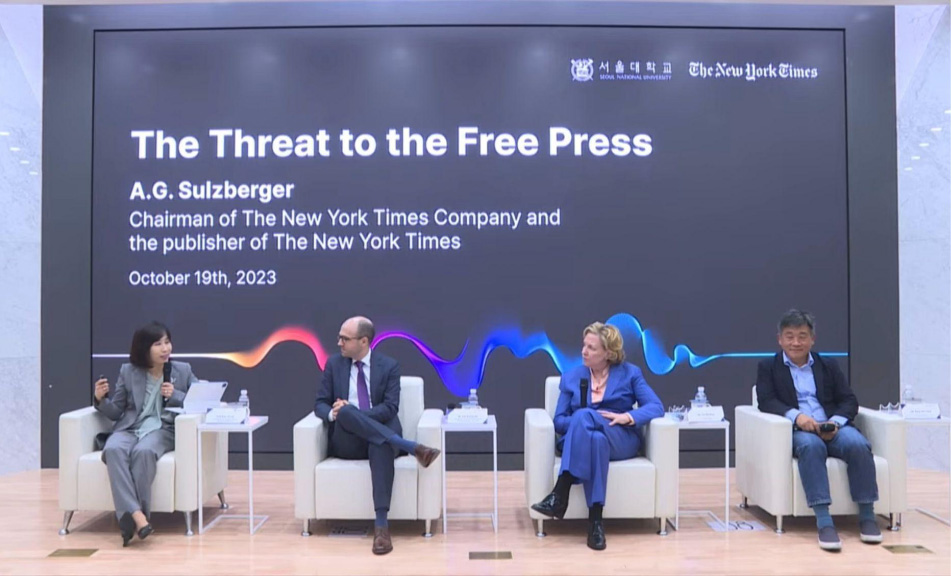On October 19, the SNU Office of International Affairs (OIA) hosted a conversation with the Publisher and Chair of The New York Times, Arthur Gregg Sulzberger. Mr. Sulzberger and his colleagues discussed the growing challenges to the press worldwide and the dangers such challenges present to the public. Being members of one of the most respected media outlets in the world, the panel also shared their thoughts on how journalism could mitigate these challenges.

A conversation with the Publisher and Chair of The New York Times, Arthur Gregg Sulzberger
The event started with introductory remarks by Professor Theresa Seung Ah Cho, Vice President of OIA. Professor Cho highlighted her personal connection with NYT, mentioning her readership that started in high school and continues to this day. She also praised NYT’s role in being “a beacon of truth, a source of insightful analysis, and a platform for informed discourse.”
Chair & Publisher A.G. Sulzberger’s views on the threat to the free press
After the introduction, Mr. Sulzberger gave an address introducing his thoughts regarding the modern-day threat to the free press, emphasizing the role of journalism in championing liberal and democratic values. He started by pointing out the ever-narrowing ground for the freedom of the press as shown by the relocation of NYT’s Asia Headquarters from Hong Kong to Seoul, following legislation aimed at protecting national security which effectively criminalized free speech. Mr. Sulzberger explained that although Korea is not without shortcomings regarding freedom of the press, the different trajectory of Hong Kong and Seoul exemplifies Korea’s tolerance as a commitment to democracy; one that shows the public’s demand for an informed public and accountable leaders.
After addressing such challenges, Mr. Sulzberger outlined his view on the role of journalism. Stating that NYT’s mission is to seek the truth and help people understand the world, he explained the newspaper’s various efforts to fulfill its mission. By chronicling the most important news, assigning expert reporters to follow global topics, and commissioning resource-intensive investigations, NYT has provided detailed coverage on salient global issues such as the war in Ukraine, climate change, and global migration. Its investigative journalism exposed corruption and wrongdoing by documenting cases of nationalism and autocratic regimes across the world.
According to Mr. Sulzberger, despite NYT’s efforts to provide investigative journalism, the threat to the free press is greater than ever. Mr. Sulzberger mentioned journalists being harassed, intimidated, and even detained whilst in pursuit of NYT’s mission. Currently, the situation is becoming more precarious as social media is becoming a conduit for conspiracy and propaganda. This problem of widespread misinformation is aggravated by the rise of AI, which is likely to blur the lines between what is real and what is not. Increasing political polarization adds to the threat as it forces readers to seek outlets that only reinforce their skewed worldview.
Pointing out that these trends put increasing pressure on journalists to become “ideological partisans rather than independent purveyors of fact and truth,” Mr. Sulzberger emphasized journalism’s role of being the latter. He warned the audience to not take the freedom of the press for granted and urged the public to clearly make the case for why free journalism matters and why it is worth fighting for.
A comprehensive discussion on mitigating the challenges that journalism face
Mr. Sulzberger’s talk was followed by a panel discussion moderated by Professor Lee, Eun-Ju of the Department of Communication. Managing Editor Carolyn Ryan and Seoul Bureau Chief Choe Sang-Hun joined Mr. Sulzberger in the discussion.
The discussion focused on ways to mitigate the aforementioned challenges of free press in Mr. Sulzberger’s talk such as the issue of polarization, the spread of misinformation, and low public trust. The panel emphasized the role of journalists in pursuing the truth, however uncomfortable it may be. In turn, the focus was also put on the important role of the group of dedicated readers who want to challenge their worldview by absorbing differing opinions through NYT. The group also stressed that social media platforms should develop a sense of accountability and control their environment.
The examples from NYT’s reporting and its reader base were also insightful as they hinted at how journalism could continue to act as a meaningful source of information. The panel introduced NYT’s focus group interview results which showed that readers visit the Times to be challenged, seeking opinions that differ from their own. They also highlighted the verification process involved in writing investigative articles, most notably how journalists verified former President Trump’s tax return documents. Combined, the examples gave a comprehensive outlook on how journalism could gain trust and how active readers could navigate through ambiguity and nuance by entertaining multiple interpretations.
Throughout the talk, Mr. Sulzberger and the panel emphasized the role of the future generation in championing the freedom of the press. When asked what they look for when hiring a new journalist, the panel highlighted a passion for discovering new stories and humility in acknowledging the areas that one isn’t familiar with. With insightful analysis and suggestions from Mr. Sulzberger and his colleagues, the talk provided inspiration and guidance for the audience in upholding the freedom of the press.
Written by Jaeyong Lee, SNU English Editor, moonn6pence@snu.ac.kr

